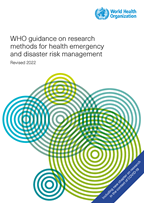- Home/
- Our Work/
- Health Emergencies/
- Research Methods/
- Sections and chapters/
- Section 3: Determining the scope of your study/
- Chapter 3.4 Ethics in research
Section 3: Determining the scope of your study
Chapter 3.4 Ethics in research

Research Methods for Health EDRM
Section navigation
- Section 3: Determining the scope of your study
- Chapter 3.4 Ethics in research
- Chapter 3.1 Asset mapping to consider outcome measurement and stakeholder engagement
- Chapter 3.2 Disaster risk factors – hazards, exposure and vulnerability
- Chapter 3.3 Designing a research intervention for Health EDRM
- Chapter 3.5 Determining the research question
- Chapter 3.6 Assessing the problem and developing a scoping review
- Chapter 3.7 Research resources to support policy and new research
Authors: Dubois C, Wright K, Parker M.
Chapter 3.4 describes the following key concepts in research ethics as they apply to health emergency and disaster risk management (Health EDRM):
- The role and importance of ethical considerations throughout the different phases of a research process.
- The limitations of normative ethical guidelines when operationalized in emergency and disaster contexts.
- The importance of reciprocal community engagement in ensuring valid and valuable results.
- The role of project managers, research funders, national governments and research ethics committees.
What is this chapter about?
It is important to balance the pursuit of knowledge with ensuring the safety and wellbeing of participants in Health EDRM research, but standard guidance on the ethics of research can be difficult to use in the disaster setting. Clarifying the ethical principles for disaster research can help researchers to ensure that their studies are ethical.
This chapter outlines universal ethical principles that researchers should observe. These include value, feasibility and validity, participant inclusion and exclusion, informed consent, harm-benefit analysis, and participant protection. It describes how stakeholder and community engagement can keep researchers accountable to these principles and help them to develop ethical partnerships with research participants.
Case studies presented in the chapter:
- Deviation from normative procedure: use of unregistered interventions for Ebola in West Africa.
- Research participant engagement during the 2006 Israeli-Hezbollah war in Lebanon.
- Delivering on the promise of research: collaborating with the New York City Fire Department following the 9/11 terrorist attacks.
What are the key messages of this chapter?
- There are ethical aspects to consider throughout the design, review, implementation and publication phases of research that go beyond merely obtaining ethical approval. These considerations help researchers to mitigate against any potential short- or long-term harm to stakeholders in a transparent manner. In addition to evaluating potential for harm alongside scope for immediate benefit, researchers must also take into account the potential broader impact of a project, for example its overall contribution to societal good, capacity to improve livelihoods, the adaptability of knowledge outcomes to benefit other research areas or communities and the potential harm of not filling an evidence gap with high quality research.
- Decisions about the design, implementation or use of research should take into account the value, feasibility and validity of the research question. The added value of research towards addressing an unmet need is necessary to justify the financial, time and human resources that is invested, including the value of missed opportunity in not conducting the research. The feasibility of implementing certain activities within a Health EDRM context must be considered alongside the desirability of completing a research project; and validity must be ensured to avoid unreliable or unusable findings.
- Normative ethical guidelines for research may have to be adapted when operationalized in emergency and disaster contexts due to the unique challenges faced across different areas including security, logistics, time-constraints, or availability of adequate human resources. However, there can be no excuses for bypassing the underpinning ethical or scientific values that ensure research is rigorous and fit for purpose.
- Reciprocal and continued engagement with the affected community is not only key to understanding practical and contextual elements that will facilitate the collection of data and improve the quality of evidence, but is also essential for the development of a respectful partnership in which the participants’ interests are not only considered, but protected, especially within the Health EDRM context where the community is made more vulnerable by its circumstances. Outcomes of the research should ultimately be fed back to the community, in order to empower and build capacity, and promote resilience to future disaster or emergency situations.
